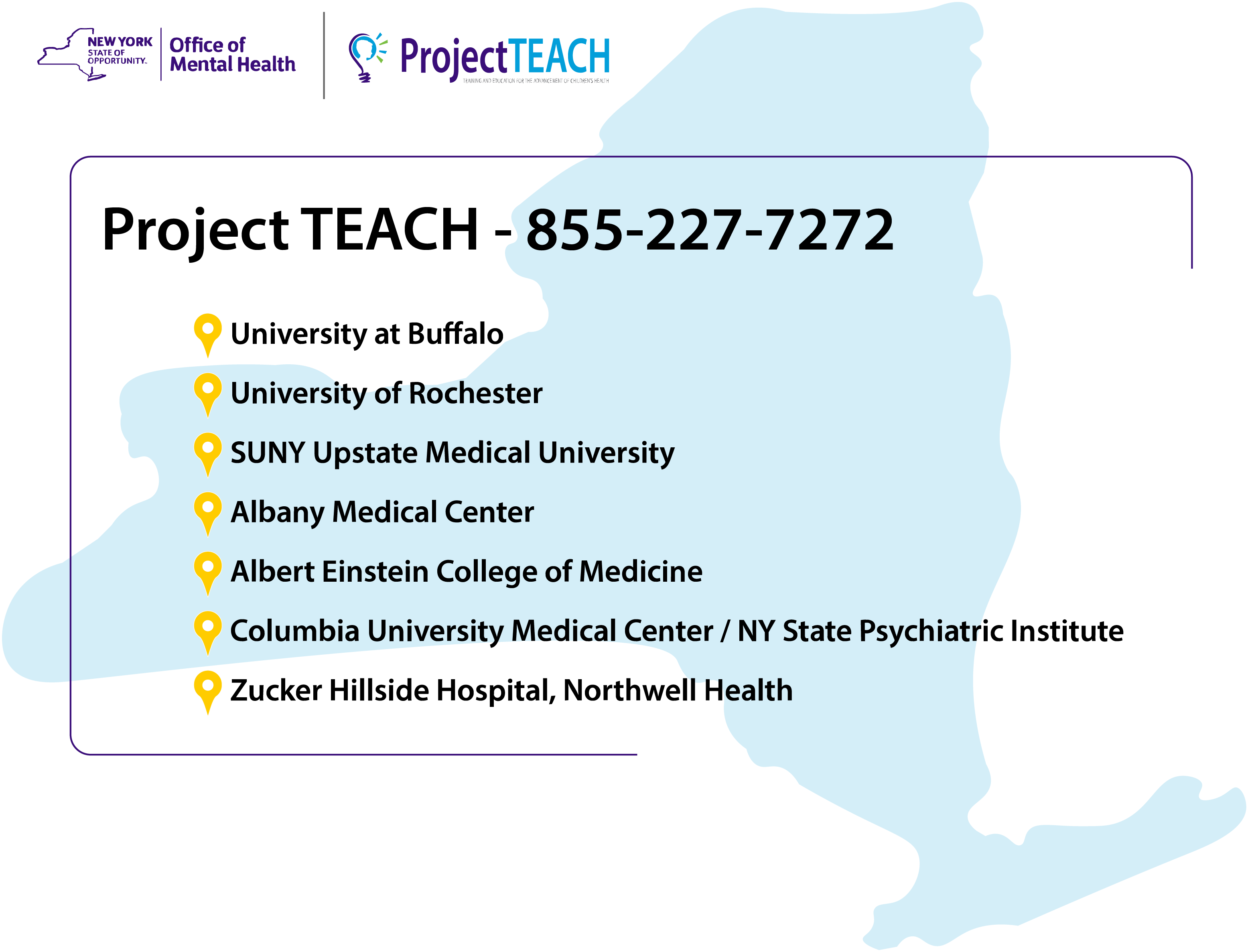
Maternal Mental Health Resources
In 2018 New York State launched a broad effort to combat maternal depression. Maternal depression and related mood and anxiety disorder are prevalent and have serious impacts on parents and their babies. If you can identify and treat these conditions early, it leads to better health outcomes for mothers and children.


Our clinical teams are here to help identify mental health and related resources in your community to assist your patients. Each hub Liaison Coordinator has comprehensive knowledge of what resources are available in their region of the state, together providing expert knowledge of the whole state.
For help with referrals call us at 1-855-227-7272 Monday-Friday 9 am-5 pm.
View Clinical TeamsReal Time Access to Reproductive Psychiatrists
Project TEACH provides real time access to reproductive psychiatrists to address your questions about how to help your patients with maternal mental health concerns. For timely consultations with a reproductive psychiatrist call us at today.
Call us at 855-227-7272For nonurgent questions email us and we will respond within 2 business days.
Learn MoreMarch 23, 2016 - It was almost a year ago that the American College of Obstetricians and Gynecologists came out unequivocally in favor of universal screening for perinatal depression. In the revised policy statement from ACOG’s Committee on Obstetric […]
March 23, 2017 - The following post was first published in OB/GYN News. Please see our OB/GYN News archives here. Publish date: March 3, 2017 Over the last decade, appreciation of the prevalence of perinatal depression – depression during pregnancy and/or […]
January 19, 2018 - The following post was first published in OB/GYN News. Please see our OB/GYN News archives here. Publish date: November 22, 2017 Over the last several years, there’s been increasing interest and ultimately a growing number of mandates across […]
A 17-21 item questionnaire to rate the severity of depression in patients. Questionnaire and scoring.
A 3-item item questionnaire to identify probable major depressive disorders. Questionnaire and scoring.
A 10-item questionnaire to screen the severity of depressive episodes in patients with mood disorders. Questionnaire.
A 20-item scale that asks caregivers to rate how often over the past week they experienced symptoms associated with depression. Scale. Click here for scoring.
A New York State Obstetric Hemorrhage Project Interactive Online Webinar presented by Project TEACH Maternal Mental Health Initiative
A 7-item questionnaire to screen for the severity of a patient’s depression. Questionnaire and scoring.
A 21-question psychometric questionnaire to screen for the severity of a patient’s depression. Questionnaire and scoring.
A questionnaire used to determine the probable onset of bipolar disorders (including Bipolar I, Bipolar II and Bipolar NOS). Questionnaire and scoring.
A 7-item questionnaire used to measure the severity of anxiety, and probable occurrence of generalized anxiety disorder. Questionnaire and scoring.
A 9-item questionnaire to inquire about the frequency of depressed mood and anhedonia over the past two weeks. This can be used following a positive PHQ-2 screening. Questionnaire and scoring.
A 2-item questionnaire used to inquire about the frequency of depressed mood and anhedonia over the past two weeks. Questionnaire and scoring.
An article showing the benefits of continuous support during labor and childbirth (e.g. doula) support.
A guide on how to find and work with birth and postpartum doulas provided by Postpartum Support International.
Supportive services for new and expecting moms.
Dr. Anna Glezer: A physician’s expert guidance on your mental health & emotional well-being during pregnancy, delivery, & postpartum. Articles, guides, & advice on mood, anxiety, mental illness, hormones, treatments, resources, & many others.
A Black-women led cross-sectoral alliance to advocate, drive research, and shift culture for Black maternal health, rights, and justice.
A Postpartum Support International program to support families and providers of color around perinatal mood and anxiety disorders.
A peer online support group to assist in breaking cultural barriers in maternal mental health awareness.
A website to helping fathers and families address postpartum depression, including peer support.
A comprehensive statewide guide to identify peer support and other resources for perinatal and postpartum women.